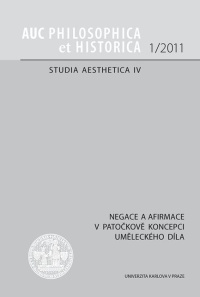Problematičnost smyslu a vnímání
The Problematic Nature of Meaning and Art
Author(s): Miloš ŠevčíkSubject(s): Philosophy
Published by: Univerzita Karlova v Praze, Nakladatelství Karolinum
Summary/Abstract: This article considers how Jan Patočka’s concept of the meaning of life and things is related to hisconsiderations on art. First, it points to Patočka’s concept of the ‘shakiness’ of graspable meaning. This shakiness, which ensues from beings’ explicit relation to being, enables one to conceive true meaning not as definitive and secured, but as meaning that consists in the ‘seeking of being’, which both enables every conceivable meaning and then shakes it up. Further, the article discusses Patočka’s reflections on the difference between meaning in traditional art and meaning in modern art. Whereas traditional art ‘narrates’ objective, binding, and general meaning, modern art expresses subjective, individual meaning. Patočka argues that the irreducible plurality of the meanings of modern artworks evokes a feeling of disharmony, but it also proves the fact of freedom. Lastly, the article considers Patočka’s opinions on the character and potential of contemporary art. It emphasizes that, in contrast to modern art, which always expresses a personal view of meaning, contemporary art ‘encircles’ and ‘realizes’ the dramatic character of the only unshakable meaning, which results from beings’ explicit relation to being.
Journal: Acta Universitatis Carolinae Philosophica et Historica
- Issue Year: IV/2011
- Issue No: 1
- Page Range: 19-29
- Page Count: 11
- Language: Czech

